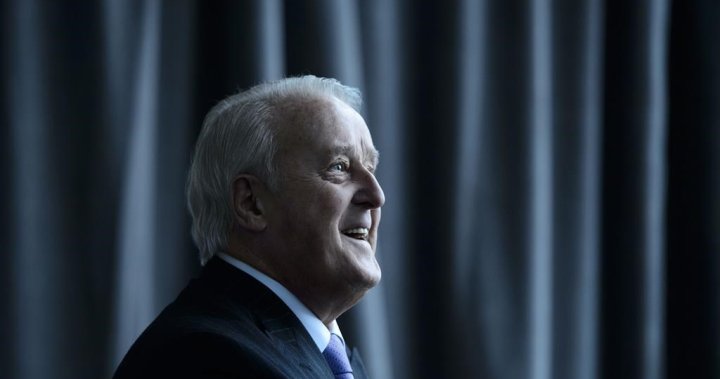Brian Mulroney will always be considered Atlantic Canada’s “greatest” prime minister and one of Canada’s most consequential leaders, says former New Brunswick premier Frank McKenna.
McKenna, who is also the former Canadian ambassador to the United States, had high praise for his good friend who passed away at age 84 on Thursday, saying Mulroney “left big footprints in the sand.”
“I think when he’s judged by history, he’ll be considered one of our most consequential prime ministers by a long shot,” McKenna told The West Block host Mercedes Stephenson.
“But in Atlantic Canada, he’ll always be considered our greatest prime minister.”
Mulroney’s daughter Caroline announced his death in a social media post on X, saying, “The country’s 18th prime minister died peacefully and surrounded by family.”
Born in Baie-Comeau, Que., in 1939, Mulroney built a political career marked by his leadership of the at-times fractious coalition of Western conservatives, Red Tories and Quebec nationalists that made up the old centrist Progressive Conservative Party. His legacy includes securing the original NAFTA trade deal with the U.S. and Mexico as well as passing the goods and service tax into law.
He has also been commended for his strong opposition to apartheid in South Africa, helping to lead the global sanctions that brought that regime to an end, and his environmental achievements, including acid rain reductions and the passage of the Canadian Environmental Protection Act.
“I think free trade and the GST (gross domestic product) are two of the most consequential, public policy developments literally, in the history of our country. They’re really pretty, pretty transformational,” McKenna said.
Breaking news from Canada and around the world
sent to your email, as it happens.
Mulroney’s deep connection with Atlantic Canada during his time as prime minister between 1984 to 1993 had a major influence on the regions, McKenna said. Some of his significant initiatives include the formation of the Confederation Bridge, the Hibernia project and the establishment of the Summerside tax centre.
“In my case as a premier, I’ve paved the road from one end of New Brunswick to the other with Brian Mulroney, and people will never forget him for that,” he said.

McKenna also referenced Mulroney’s signing of the Atlantic Accord, a deal that would shape Newfoundland and Labrador’s offshore oil industry.
McKenna said he’s certain Canadians will consider Mulroney “wonderful” for his accomplishments, but that he’ll also be given credit for “the things that he tried to accomplish.”
“And by that, I mean constitutional reconciliation, because he put his life’s blood into that and did everything he could in his power,” he said.
On Thursday night, Prime Minister Justin Trudeau commended Mulroney’s dedication to proving Canada belonged on the world stage.
“He was committed to this country, loved it with all his heart and served it for many, many years in many different ways,” Trudeau told reporters.
“He shaped our past, but he shapes our present and he will impact our future as well. He was an extraordinary statesman and he will be deeply, deeply missed.”
Mulroney, who advised the federal cabinet during the trade talks with former U.S. president Donald Trump, said Trudeau showed vision and a steady hand during negotiations and helped preserve the country’s economy.
If Mulroney were around to give political leaders a piece of advice now, McKenna said he would say “that you can disagree without being disagreeable.”
“He would say that, you know when the game is over and we’re off the ice, we can have a beer together and talk.”
McKenna said that though Mulroney will be largely remembered for his major contributions to the country, to him, his friends’ legacy is also marked by his “individual acts of kindness.”
“The calls that he would make to people in hospital or in the case of a bereavement, the way that he would remember little things in your life,” McKenna remembered.
“And in my case, we had a relationship that spanned many decades. (We were) able to put our hands across our political differences and just be warm friends. And I can’t think of more than a week or two when we didn’t talk and laugh and sometimes cry about memories and stories. So those are the smaller things, but in many ways the more meaningful things,” he said.
–with files from Global News’ Aaron D’Andrea
© 2024 Global News, a division of Corus Entertainment Inc.










